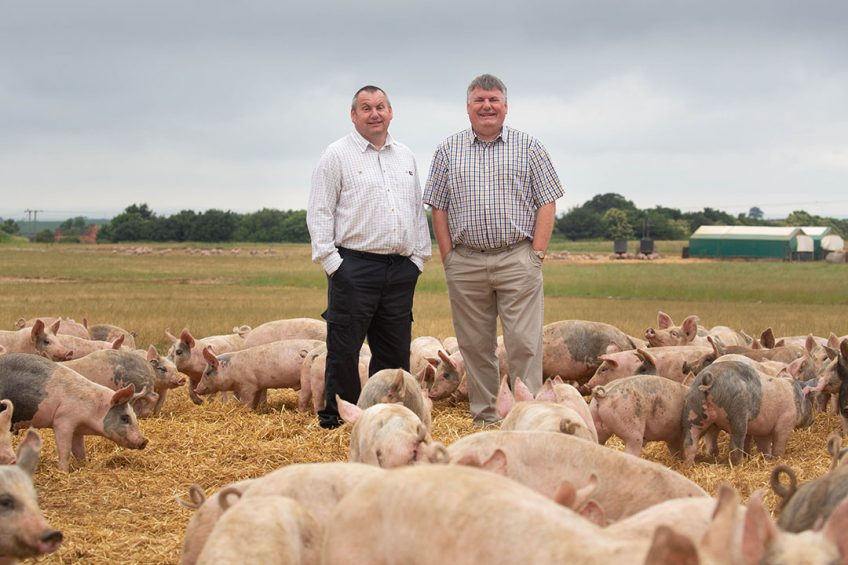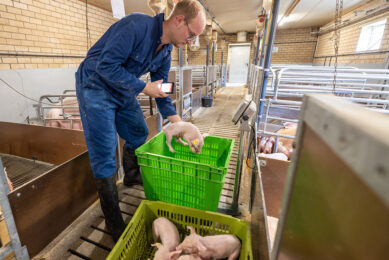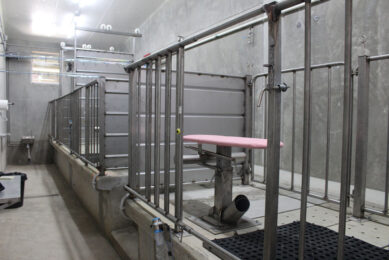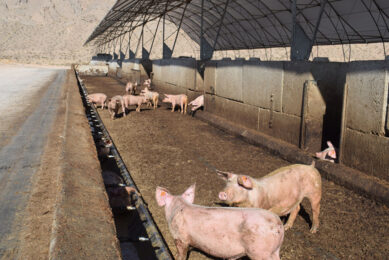Farm visit: Outdoor UK farm faces both Brexit and Covid-19

About 40% of the UK’s sows are kept in outdoor facilities. That type of high-welfare pig production is not having the easiest of times with uncertain factors like Brexit and Covid-19 coinciding. How do the award-winning producers at North Farm Livestock manage?
 PROFILE:
PROFILE:
Brothers Ian, left, and Michael Baker of North Farm Livestock based at Syderstone, who have won the national Pig Farmer of the Year title, with one of their 5-week-old Hampshire free range piglets. Photo: Denise Bradley
Connecting consumers to the benefits of the high welfare production of outdoor pork is just one of the initiatives a pig farming business in the east of England strives to achieve each year. North Farm Livestock makes a huge effort to create a better understanding of how it produces pigs in the healthy outdoors in order to improve the somewhat poor perceptions that some consumers have.
Run by brothers Michael and Ian Baker, who are the directors and owners of North Farm Livestock, the business is located across a number of sites in the north Norfolk area, UK. As an outdoor pig production unit, the emphasis for the team is on maintaining a high herd health status, as well as high animal welfare, which should hopefully be an attraction to consumers concerned about how their food is produced.
 Brexit and its effect on pig farmers
Brexit and its effect on pig farmers
The UK is about to step out of the EU. What will it mean for the country’s pig farmers and agriculture? Angela Christison of AHDB Pork and Karl Schneider, editorial director of Farmers Weekly, share their ideas.
Brexit and Covid-19
“We operate from 25 sites spread across north Norfolk covering an area that is 43 miles (69 km) east to west and 31 miles (50 km) north to south,” Ian explains. “Our main breeding base is at Bayfield near Holt, while our finishing business is based at Syderstone near Fakenham.”
The main breeding sows are split across a number of units and the business has immediate plans to increase the total number of sows to help meet an increasing demand for quality pig meat. Michael says: “We are a high welfare outdoor breeding and outdoor finishing producer with all progeny bred and finished as free-range. North Farm Livestock has 4,700 sows spread across 4 breeding herds in addition to its own gilt mating unit that supplies replacement herds for the breeding units.
“Plans are in hand to add a 5th herd taking sow numbers to 5,800. Piglets are weaned at 28 days and moved to a finishing site run by the business resulting in the production of approximately 2,500 free-range pigs per week,” he says.

Running an efficient pig business
Running an efficient pig-producing business is the ultimate goal of every pig farmer taking control of all the input costs to make a profit. Managing the output prices, however, is far from the reach of most pork producers.
“On our farms the pigs are taken right through from birth to fattening with the sales weight aimed at 110–115 kg live weight,” says Michael. “All the finished pigs are sold to Tulip, the UK’s largest pork producer, as part of the supply chain for a major food retailer.

“In our herds we prefer to use the Hampshire boar crossed with PIC gilt and from this cross we achieve an average litter size of 12.5 piglets per sow. All feed for the pigs is bought in with dietary support provided by BQP, who have over 40 years’ experience breeding pigs in the UK,” says Michael.
As with every farm there are some mortalities and there is also a never-ending fight to prevent any form of disease getting into the herd. Michael adds: “Our pre-weaning mortality rate is approximately 9%, while the post-weaning mortality rate sits at around 3%. We don’t have African Swine Fever here but tight biosecurity remains high on our agenda.
“Our main office site and yard are pig free and it includes wash facilities for equipment and staff. All our units have individual staff restrictions on site entry to avoid any cross contamination. In addition, we have protocols for both visitor and auditor visits,” he says.

Key challenges for this farmer
The pig production sector has its fair share of key challenges, some influenced by local factors and some occurring at a global level. For Ian the main challenges affecting the business include maintaining a high herd health status, finding good staff with the appropriate skill set and retaining them and keeping staff training up to date to comply with the latest legislation and stakeholder management practices.
![]() Health Tool
Health Tool
Find out all there is to know about pig health using Pig Progress’ unique Pig Health Tool
Key challenges for the pig sector
On top of that he says a number of key challenges face the UK sector as a whole after it climbs out of current situations such as leaving the European Union. Ian says, “The key challenges for the pig sector, as I see it, include the ever-increasing focus on welfare, with the use of farrowing crates being a current example. Of course then there is the uncertainty of how the UK will cope with trade deals post-Brexit, particularly if these involve the importation of foodstuffs with different or inferior standards.”
He adds, “We also need to be mindful of the recession in the UK as we emerge out of this Covid-19 pandemic era and how that will impact on the sector. Then there is also the difficulty of the public understanding of UK standards against others and public buying habits to contend with.”
 Farm Visit
Farm Visit
Pig Progress regularly goes on-farm in leading swine production sites across the globe.
Technology within the pig sector
Technology is being developed at a very fast pace, which means farmers must also try to stay abreast of the latest products and investigate how to make their own businesses more efficient.
Michael is also keeping a close eye on what is available for pig farms and has invested in new technology for their farms. He says, “Yes, we have looked at and invested in a number of various technologies such as IDAL vaccination guns, wand and tablet recording as well as vehicle and staff tracking to improve our health and safety.”
Growing Healthy Pigs campaign
Ian and Michael participate in the Growing Healthy Pigs campaign, an MSD initiative to support the pig industry in driving health, welfare and a positive public perception. “We have a big commitment and focus on welfare and animal health,” Michael says. “We have driven down our antibiotic use across our business which has also led to our involvement with the Growing Healthy Pigs campaign.
Public perception of the pig industry
“There are a number of wider issues related to the public perception of our industry that we must address to improve in the future. These include a lack of clarity of food labelling. Sometimes the public does not know what they are purchasing or what the differences are between products.
“Also, the public will indicate welfare and sustainability as important buyer behaviour issues but their buying pattern doesn’t reflect this. We need to address that.
“Our outdoor production system is visible but is this how the public perceives pig production? There is a lot of work that remains to be done to highlight the lengths we as pig farmers go to in order to produce the best food product we can,” he says.
 Beheer
Beheer








 WP Admin
WP Admin  Bewerk bericht
Bewerk bericht